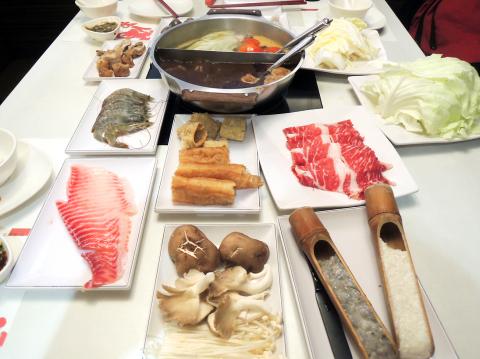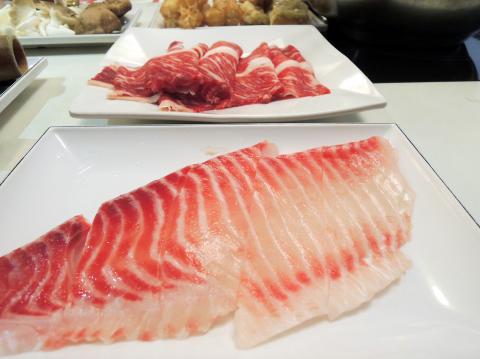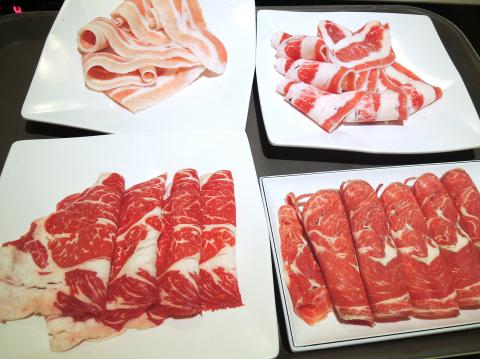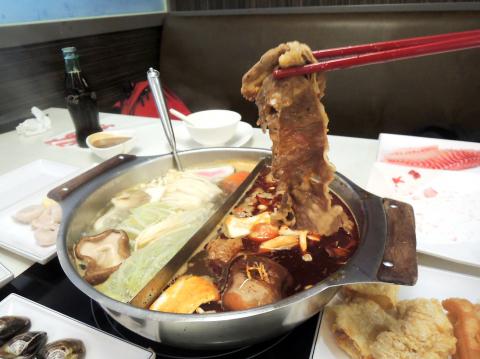There are numerous spicy hot pot restaurants around Taipei, and the range in price and quality is wide, from inexpensive NT$299 all-you-can-eat joints to pricey establishments that provide high-end ingredients. Established in 2005, Man Tang Hung Spicy Hot Pot (滿堂紅頂級麻辣鴛鴦火鍋) is somewhere in between. Despite the all-you-can-eat style, the restaurant chain is famous for its food and service.
Man Tang Hung is currently operating several outlets in northern and central Taiwan. I recently visited the Fuxing branch (復興店) with two friends for a weekday lunch. The restaurant, which was clean and bright, is located inside an office building and is a five-minute walk from Zhongxiao Fuxing MRT Station (忠孝復興站). We arrived at around 1pm and were quickly seated at a table with two sofas in a semi-open cubicle that gave us a degree of privacy.
Man Tang Hung offers six varieties of bottomless soup: spicy, seaweed, pickled cabbage, milky miso, aloe and fruit kimchi. We ordered the hottest spicy soup (麻辣鍋), which is served with duck blood jelly and tofu, as well as the lightest seaweed soup (昆布鍋), which came in the same bowl separated by a divider. The ox bone-based broth for the spicy soup is slowly cooked with about 20 ingredients, Chinese medicinal herbs and spices such as Chinese pepper and bean paste for six to eight hours. The waitress stressed that it did not contain any artificial chicken broth cubes or monosodium glutamate (MSG). The restaurant certainly lived up to its reputation for good service — the broth was savory but slightly too spicy for me and when I asked the waitress to add just a little non-spicy broth to reduce the intensity, she was more than willing to accommodate my request.

Photo: Eddy Chang, Taipei Times
Man Tang Hung is different from the typical all-you-can-eat hot pot restaurants — you don’t choose ingredients from an open refrigerator. Instead, the staff brings the dishes to your table as you order. As Taiwan’s only all-you-can-eat hot pot restaurant with a Platinum US Beef certification developed by the US Meat Export Federation, the restaurant is certainly proud of its beef. It offers four parts of US Prime or Choice beef, and high-quality pork, lamb and chicken. The costly US boneless short ribs were not available for lunch during weekdays, so we ordered the other three parts of beef instead. The thickly-sliced beef quickly turned pink after being dunked in the boiling soup for 30 seconds and it was tender and flavorsome after absorbing the broth.
The restaurant also boasts a good selection of seafood and vegetables. We put the seafood mostly in the non-spicy soup, so we could taste its natural sweetness. All the shrimp, squid and clams tasted fresh, and the texture of the snapper was particularly delicate and moist. The mushroom combo platter featuring four varieties is also recommended, as you can enjoy Chinese, king, needle and oyster mushrooms at the same time.
Nothing is more satisfying than a few scoops of ice cream after a spicy hot pot. Unlike most all-you-can-eat restaurants, which offer relatively cheap ice cream, Man Tang Hung offers eight varieties of Haagen-Dazs as well as eight varieties of Meiji ice cream. According to restaurant owner Wang Ching-hua (王清華), his restaurant chain is paying close to NT$2 million to Haagen-Dazs per month, and all the outlets are able to choose the newest and most popular flavors freely.

Photo: Eddy Chang, Taipei Times
There are two prices at the restaurants: NT$498 for lunch during weekdays and NT$598 for dinner, weekends and all holidays, along with a 10 percent service charge. There is a two-hour seating limit for each table. Overall, Man Tang Hung was an enjoyable (and spicy) dining experience, and I would have visited more often had the restaurant not raised its price twice this year.

Photo: Eddy Chang, Taipei Times

Photo: Eddy Chang, Taipei Times

On April 26, The Lancet published a letter from two doctors at Taichung-based China Medical University Hospital (CMUH) warning that “Taiwan’s Health Care System is on the Brink of Collapse.” The authors said that “Years of policy inaction and mismanagement of resources have led to the National Health Insurance system operating under unsustainable conditions.” The pushback was immediate. Errors in the paper were quickly identified and publicized, to discredit the authors (the hospital apologized). CNA reported that CMUH said the letter described Taiwan in 2021 as having 62 nurses per 10,000 people, when the correct number was 78 nurses per 10,000

As we live longer, our risk of cognitive impairment is increasing. How can we delay the onset of symptoms? Do we have to give up every indulgence or can small changes make a difference? We asked neurologists for tips on how to keep our brains healthy for life. TAKE CARE OF YOUR HEALTH “All of the sensible things that apply to bodily health apply to brain health,” says Suzanne O’Sullivan, a consultant in neurology at the National Hospital for Neurology and Neurosurgery in London, and the author of The Age of Diagnosis. “When you’re 20, you can get away with absolute

When the South Vietnamese capital of Saigon fell to the North Vietnamese forces 50 years ago this week, it prompted a mass exodus of some 2 million people — hundreds of thousands fleeing perilously on small boats across open water to escape the communist regime. Many ultimately settled in Southern California’s Orange County in an area now known as “Little Saigon,” not far from Marine Corps Base Camp Pendleton, where the first refugees were airlifted upon reaching the US. The diaspora now also has significant populations in Virginia, Texas and Washington state, as well as in countries including France and Australia.

May 5 to May 11 What started out as friction between Taiwanese students at Taichung First High School and a Japanese head cook escalated dramatically over the first two weeks of May 1927. It began on April 30 when the cook’s wife knew that lotus starch used in that night’s dinner had rat feces in it, but failed to inform staff until the meal was already prepared. The students believed that her silence was intentional, and filed a complaint. The school’s Japanese administrators sided with the cook’s family, dismissing the students as troublemakers and clamping down on their freedoms — with